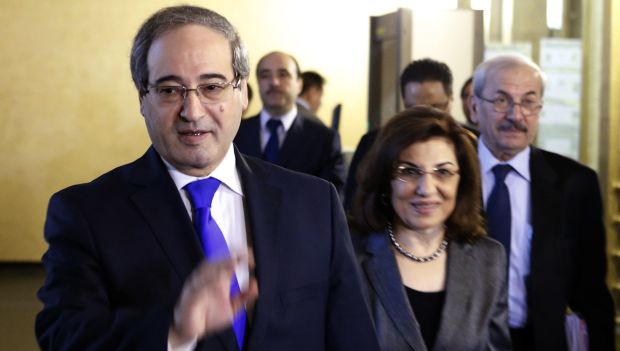
Syria’s Deputy Foreign Minister Faisal Miqdad (L) leaves the headquarters of the Russian foreign ministry in Moscow on November 18, 2013. (REUTERS/Grigory Dukor)
Beirut and London, Asharq Al-Awsat—UN Secretary-General Ban Ki-moon announced on Monday that the Geneva II peace conference on the Syrian conflict will be held in mid-December. The secretary-general said UN–Arab League envoy Lakhdar Brahimi will try to set the exact date during a meeting between US and Russian diplomats in Geneva on November 25.
The Syrian opposition, meanwhile, is coming under American pressure to accept an invitation by Russia to go to Moscow to discuss the peace conference. The Syrian National Coalition, the most prominent alliance of opposition groups, is waiting for Russia to set new dates for meetings with Russian officials after rejecting the first suggested dates of November 18 to 21, in order to avoid meeting a Syrian government delegation.
Speaking to Asharq Al-Awsat, Coalition member Samir Al-Nashar said he hoped that talks with Russia would adhere to the points previously announced by the Coalition on Geneva II. He said: “The picture may become clearer after the Russian–American meeting, especially [now] that there seems to be an agreement between the two which nobody knows anything about. We realize that the issue is in the hands of Iran, which runs military operations inside Syria, while so far it has not announced its position on Geneva II.”
He added: “Despite that, we hope that a new decision is announced on which we can depend and which shows a real intention to produce a new road map that in turn produces a solution for the Syrian crisis, even if we are suspicious of Russia’s intentions.”
Nashar claimed that the Americans were applying pressure on the opposition to go to Moscow. However, he added that “we need to ensure that this is not another maneuver to make us go to Russia only to meet with Syrians who are supported by Russia and pretend to be [members of the] opposition,” in reference to former deputy premier Qadri Jamil, who was recently dismissed by Assad for unauthorized meetings with Russian and US diplomats.
The Syrian deputy foreign minister, Faisal Miqdad, and presidential media adviser, Bouthaina Shaaban, arrived in Moscow on Monday to discuss preparations for Geneva II. The two senior Syrian officials will hold meetings with Russian deputy foreign ministers Guennadi Gatilov and Mikhail Bogdanov.
In the meantime, Bogdanov held meetings with Iranian deputy foreign minister Hossein Amir-Abdollahian. “We see Iran as an important partner in all Middle East affairs,” he said, adding, “This will give us an opportunity to discuss developments in Syria and around it.”
Meanwhile, the Kremlin announced that Russian President Vladimir Putin held a telephone conversation with Iranian President Hassan Rouhani and stressed the importance of the efforts to organize the Geneva II conference. Washington, however, has expressed reservations about allowing Iran to participate in the Syrian peace talks.
For his part, Russian Foreign Minister Sergey Lavrov criticized the opposition for placing conditions on attending the Geneva II conference. He said: “The opposition’s linking of its participation in Geneva II with achieving a breakthrough on the humanitarian front is strange and worrying, because the conference will never be held if we wait for the ideal conditions for that.”
He said US Secretary of State John Kerry agreed with him that humanitarian efforts must be intensified, but that they should not be used as an excuse to avoid attending the conference.
